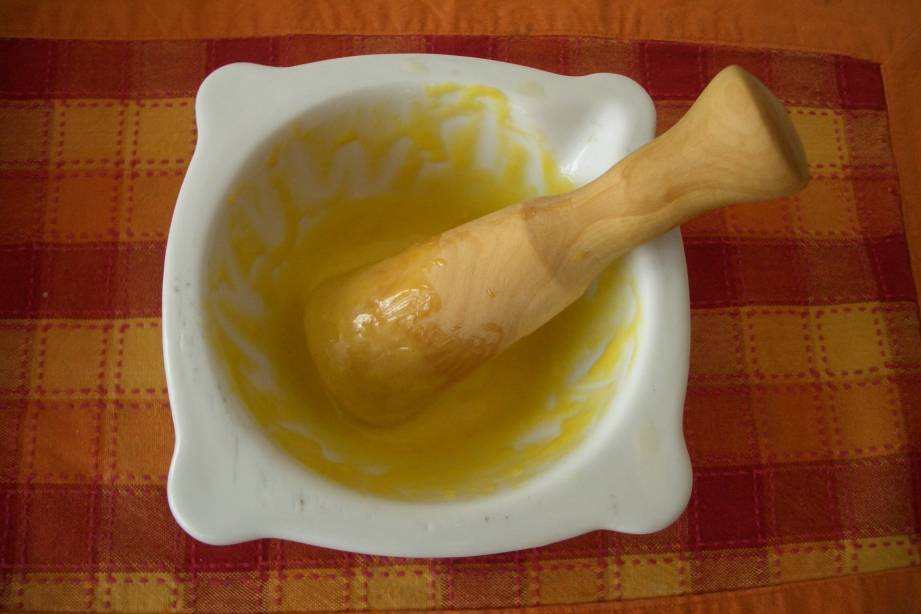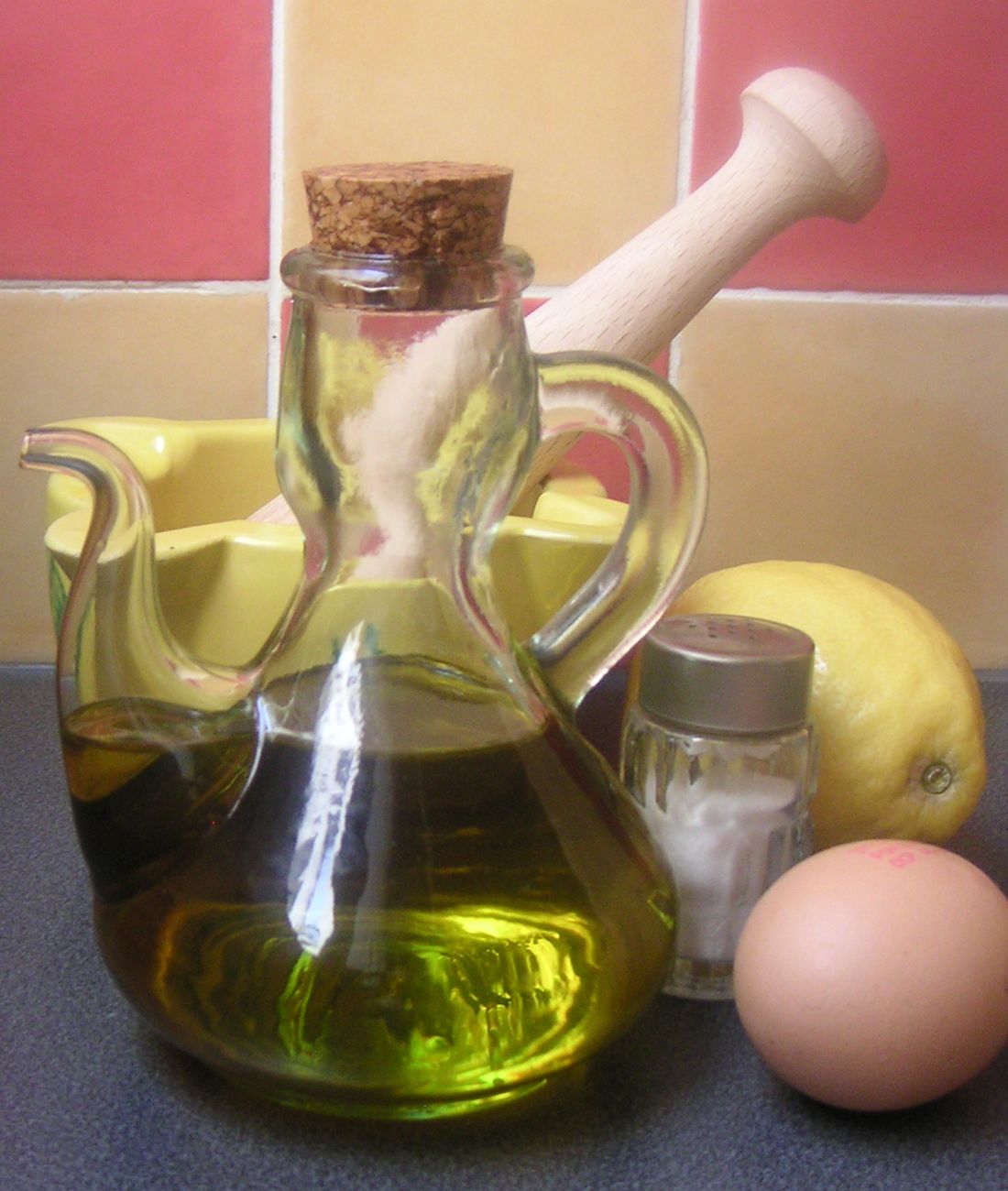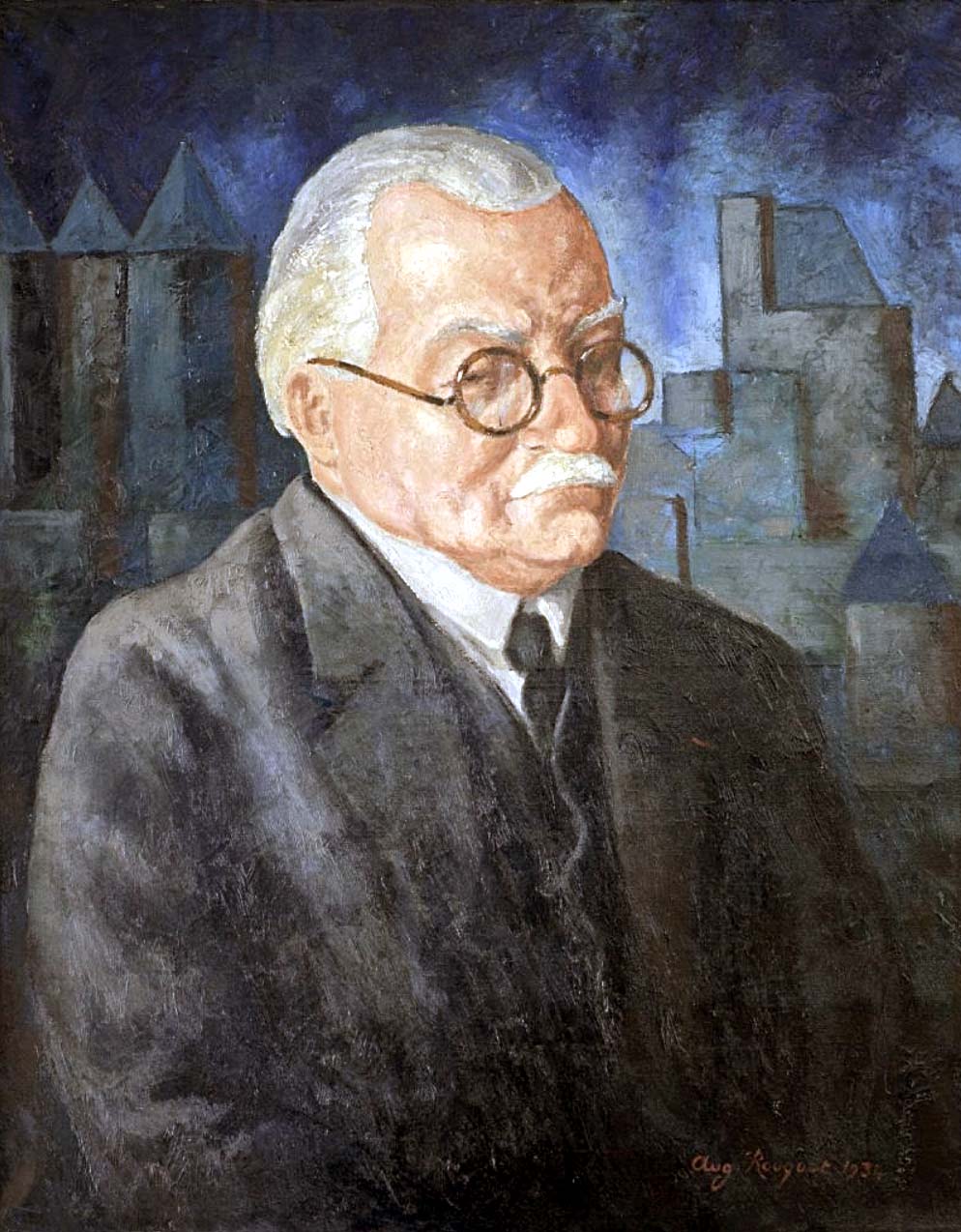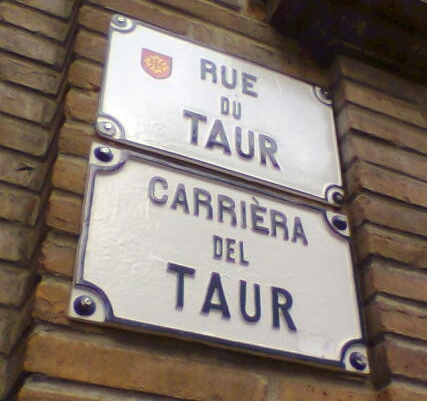|
Alioli
Aioli, allioli or aïoli ( or ; Provençal oc, alhòli or ''aiòli'' ; ca, allioli ; es, alioli ) is a cold sauce consisting of an emulsion of garlic and olive oil; it is found in the cuisines of the northwest Mediterranean, from Andalusia to Calabria. The names mean "garlic and oil" in Catalan and Provençal. It is found in the cuisines of the Mediterranean coasts of Spain ( Catalonia, the Valencian Community, the Balearic Islands, Murcia, and eastern Andalusia), France (Provence), Italy (Sicily and Calabria), and Malta. Some versions of the sauce are closer to a garlic mayonnaise, incorporating egg yolks and lemon juice, whereas other versions lack egg yolk and contain more garlic. This gives the sauce a pastier texture, making it more laborious as the emulsion is harder to stabilize.J.-B. Reboul, ''La Cuisinière Provençale'' 1910 (1st edition); 1989 (25th edition), p. 88Robert Courtine, ''The Hundred Glories of French Cooking'' (tr. Derek Coldman), 1973, p. 140H ... [...More Info...] [...Related Items...] OR: [Wikipedia] [Google] [Baidu] |
Mayonnaise
Mayonnaise (; ), colloquially referred to as "mayo" , is a thick, cold, and creamy sauce or dressing commonly used on sandwiches, hamburgers, composed salads, and French fries. It also forms the base for various other sauces, such as tartar sauce, fry sauce, remoulade, salsa golf, and rouille. Mayonnaise is an emulsion of oil, egg yolk, and an acid, either vinegar or lemon juice; there are many variants using additional flavorings. The color varies from near-white to pale yellow, and its texture from a light cream to a thick gel. Commercial eggless imitations are made for those who avoid chicken eggs because of egg allergies, to limit dietary cholesterol, or because they are vegans. History ''Mayonnaise'' is a French cuisine appellation that seems to have appeared for the first time in 1806. The hypotheses invoked over time as to the origin(s) of mayonnaise have been numerous and contradictory. Most hypotheses do however agree on the geographical origin of ... [...More Info...] [...Related Items...] OR: [Wikipedia] [Google] [Baidu] |
Sauce
In cooking, a sauce is a liquid, cream, or semi-solid food, served on or used in preparing other foods. Most sauces are not normally consumed by themselves; they add flavor, moisture, and visual appeal to a dish. ''Sauce'' is a French word taken from the Latin ''salsa'', meaning ''salted''. Possibly the oldest recorded European sauce is garum, the fish sauce used by the Ancient Romans, while doubanjiang, the Chinese soy bean paste is mentioned in ''Rites of Zhou'' in the 3rd century BC. Sauces need a liquid component. Sauces are an essential element in cuisines all over the world. Sauces may be used for sweet or savory dishes. They may be prepared and served cold, like mayonnaise, prepared cold but served lukewarm like pesto, cooked and served warm like bechamel or cooked and served cold like apple sauce. They may be freshly prepared by the cook, especially in restaurants, but today many sauces are sold premade and packaged like Worcestershire sauce, HP Sauce, soy s ... [...More Info...] [...Related Items...] OR: [Wikipedia] [Google] [Baidu] |
Prosper Montagné
Prosper Montagné (; 14 November 1865 – 22 April 1948) was one of the most renowned French chefs of the Belle Époque and author of many books and articles on food, cooking, and gastronomy, notably Larousse Gastronomique (1938), an encyclopedic dictionary of the French culinary arts. While Montagné was once as famous as his friend Auguste Escoffier, and was one of the most influential French chefs of the early twentieth century, his fame seems to have faded somewhat over the years. In the 1920s, Montagné, Escoffier, and Philéas Gilbert -- their close friend and collaborator, and an acclaimed chef and writer in his own right -- were the French chefs and culinary writers esteemed above others by many French journalists and writers. After Montagné's death, the chef and author Alfred Guérot's description of the troika as the "celebrated contemporary culinary trinity: Auguste Escoffier, the father; Philéas Gilbert, the son; Prosper Montagné, the spirit" reflects the reverence in ... [...More Info...] [...Related Items...] OR: [Wikipedia] [Google] [Baidu] |
Allioli (1793-1873), Roman Catholic theologian and orientalist
{{disambiguation ...
Allioli may refer to: * Allioli, the Valencian variant of the garlic sauce Aioli * Joseph Franz von Allioli Joseph Franz von Allioli (10 August, 1793 at Sulzbach, Germany – 22 May, 1873 at Augsburg, Germany), was a Roman Catholic theologian and orientalist. Allioli studied theology at Landshut and was ordained at Ratisbon in 1816. From 1818 to ... [...More Info...] [...Related Items...] OR: [Wikipedia] [Google] [Baidu] |
Diccionario Panhispánico De Dudas
The ''Diccionario panhispánico de dudas'' (Pan-Hispanic Dictionary of Doubts) or ''DPD'' is an elaborate work undertaken by the Real Academia Española (RAE – Royal Spanish Academy) and the Association of Spanish Language Academies with the goal of resolving questions related to the proper use of the Spanish language. Like other publications of the academy, such as the '' Diccionario de la lengua española de la Real Academia Española'', the work follows a linguistically prescriptive philosophy as opposed to a descriptive one. The first edition was published in 2005 and is now being revised to more properly align with principles set forth by the academy's other publications. The project was begun in response to the 50,000 questions received yearly by the constituent members of the Association of Spanish Language Academies. It is composed of: * The dictionary itself * A set of five appendices covering conjugation of verbs, abbreviations, symbols that can be ordered alphabe ... [...More Info...] [...Related Items...] OR: [Wikipedia] [Google] [Baidu] |
Asociación De Academias De La Lengua Española
The Association of Academies of the Spanish Language ( es, Asociación de Academias de la Lengua Española, ASALE) is an entity whose end is to work for the unity, integrity, and growth of the Spanish language. It was created in Mexico in 1951 and represents the union of all the separate academies in the Spanish-speaking world. The association publishes reference works on the Spanish language and commemorative editions of Hispanic literature, among other publications. History Through the initiative of then-president of Mexico Miguel Alemán Valdés, the first congress of academies convened with the purpose of maintaining the integrity of and fostering the further growth of Spanish. The meeting was held from 23 April to 6 May 1951 and resulted in the creation of the association and its permanent commission. The Royal Spanish Academy (Spanish: or ) was not present at the initial meeting but participated in the permanent commission. Ever since the second congress convened in 1956, ... [...More Info...] [...Related Items...] OR: [Wikipedia] [Google] [Baidu] |
Real Academia Española
The Royal Spanish Academy ( es, Real Academia Española, generally abbreviated as RAE) is Spain's official royal institution with a mission to ensure the stability of the Spanish language. It is based in Madrid, Spain, and is affiliated with national language academies in 22 other Hispanophone nations through the Association of Academies of the Spanish Language. The RAE's emblem is a fiery crucible, and its motto is ("It purifies, it fixes, and it dignifies"). The RAE dedicates itself to language planning by applying linguistic prescription aimed at promoting linguistic unity within and between various territories, to ensure a common standard. The proposed language guidelines are shown in a number of works. History The Royal Spanish Academy was founded in 1713, modeled after the Accademia della Crusca (1582), of Italy, and the Académie Française (1635), of France, with the purpose "to fix the voices and vocabularies of the Spanish language with propriety, elegance ... [...More Info...] [...Related Items...] OR: [Wikipedia] [Google] [Baidu] |
Spanish Language
Spanish ( or , Castilian) is a Romance languages, Romance language of the Indo-European language family that evolved from colloquial Latin spoken on the Iberian peninsula. Today, it is a world language, global language with more than 500 million native speakers, mainly in the Americas and Spain. Spanish is the official language of List of countries where Spanish is an official language, 20 countries. It is the world's list of languages by number of native speakers, second-most spoken native language after Mandarin Chinese; the world's list of languages by total number of speakers, fourth-most spoken language overall after English language, English, Mandarin Chinese, and Hindustani language, Hindustani (Hindi-Urdu); and the world's most widely spoken Romance languages, Romance language. The largest population of native speakers is in Mexico. Spanish is part of the Iberian Romance languages, Ibero-Romance group of languages, which evolved from several dialects of Vulgar Latin in I ... [...More Info...] [...Related Items...] OR: [Wikipedia] [Google] [Baidu] |
Catalan Language
Catalan (; autonym: , ), known in the Valencian Community and Carche as '' Valencian'' ( autonym: ), is a Western Romance language. It is the official language of Andorra, and an official language of three autonomous communities in eastern Spain: Catalonia, the Valencian Community, and the Balearic Islands. It also has semi-official status in the Italian comune of Alghero. It is also spoken in the Pyrénées-Orientales department of France and in two further areas in eastern Spain: the eastern strip of Aragon and the Carche area in the Region of Murcia. The Catalan-speaking territories are often called the or "Catalan Countries". The language evolved from Vulgar Latin in the Middle Ages around the eastern Pyrenees. Nineteenth-century Spain saw a Catalan literary revival, culminating in the early 1900s. Etymology and pronunciation The word ''Catalan'' is derived from the territorial name of Catalonia, itself of disputed etymology. The main theory suggests ... [...More Info...] [...Related Items...] OR: [Wikipedia] [Google] [Baidu] |
Mistralian
Occitan (; oc, occitan, link=no ), also known as ''lenga d'òc'' (; french: langue d'oc) by its native speakers, and sometimes also referred to as ''Provençal'', is a Romance language spoken in Southern France, Monaco, Italy's Occitan Valleys, as well as Spain's Val d'Aran; collectively, these regions are sometimes referred to as Occitània. It is also spoken in Calabria (Southern Italy) in a linguistic enclave of Cosenza area (mostly Guardia Piemontese). Some include Catalan in Occitan, as the distance between this language and some Occitan dialects (such as the Gascon language) is similar to the distance between different Occitan dialects. Catalan was considered a dialect of Occitan until the end of the 19th century and still today remains its closest relative. Occitan is an official language of Catalonia, where a subdialect of Gascon known as Aranese is spoken in the Val d'Aran. Since September 2010, the Parliament of Catalonia has considered Aranese Occitan to be the off ... [...More Info...] [...Related Items...] OR: [Wikipedia] [Google] [Baidu] |
Occitan Language
Occitan (; oc, occitan, link=no ), also known as ''lenga d'òc'' (; french: langue d'oc) by its native speakers, and sometimes also referred to as ''Provençal'', is a Romance language spoken in Southern France, Monaco, Italy's Occitan Valleys, as well as Spain's Val d'Aran; collectively, these regions are sometimes referred to as Occitània. It is also spoken in Calabria ( Southern Italy) in a linguistic enclave of Cosenza area (mostly Guardia Piemontese). Some include Catalan in Occitan, as the distance between this language and some Occitan dialects (such as the Gascon language) is similar to the distance between different Occitan dialects. Catalan was considered a dialect of Occitan until the end of the 19th century and still today remains its closest relative. Occitan is an official language of Catalonia, where a subdialect of Gascon known as Aranese is spoken in the Val d'Aran. Since September 2010, the Parliament of Catalonia has considered Aranese Occitan to be ... [...More Info...] [...Related Items...] OR: [Wikipedia] [Google] [Baidu] |








